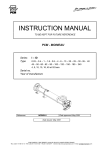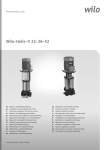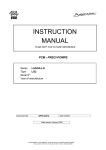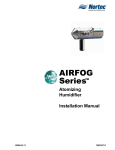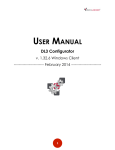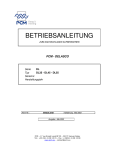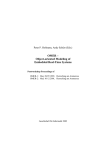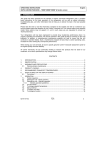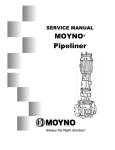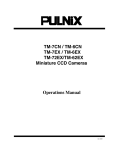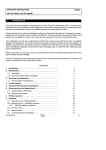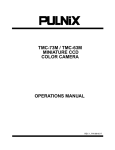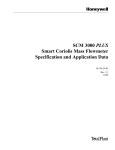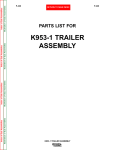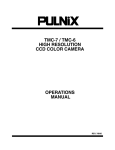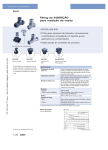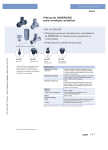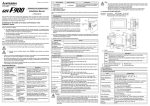Download 1 - firma-web
Transcript
INSTRUCTION MANUAL TO BE KEPT FOR FUTURE REFERENCE PCM - DELASCO Series DL Type DL35 - DL45 - DL55 Serial No. Year of manufacture Document No.: NIDEDL505A Date approved : January 2000 Date issued : January 2000 PCM POMPES-17 RUE ERNEST LAVAL-BP 35-92173 VANVES CEDEX France TEL: (33) 01 41 08 15 15 FAX: (33) 01 41 08 15 00 - TELEX: 634129 – Internet : http:/www.pcmpompes.com Email : [email protected] DECLARATION OF INCORPORATION We hereby state that the sub-assembly referred to in the technical specifications sheet cannot be put into service until the machine in which it is to be incorporated is declared compliant with the provisions of Council Directive 89/392/CEE of the Machine Directive 91/368/CEE modified 93/44/CEE and 93/68/CEE, and with the national legislation expressing it. The sub-assembly is compliant with the EN 292 harmonised norms. Vanves, 23/04/1996 For: Company name and position Innovation Manager B. LAFONT !: (33) 01 41 08 15 15 - Internet : http:/www.pcmpompes.com Email : [email protected] Thank you for selecting a pump from the PCM range 6 PRODUCT LINES PCM MOINEAU The widest range of industrial progressive cavity pumps. PCM PRECI-POMPE Electro-mechanical diaphragm and plunger dosing pumps. PCM MOINEAU OILFIELD Progressive cavity pumps for oil extraction. PCM DELASCO The most complete range of peristaltic pumps. PCM DOSYS Precision pumpheads and continuous mixers. PCM EQUIPMENT Lobe pumps and rotary piston pumps, Pipeliner-grinders. PCM markets its products throughout the world via a distribution network consisting mainly of subsidiaries and agents. All are approved by PCM, and are able to provide Service and Assistance. !: (33) 01 41 08 15 15 – Internet : http:/www.pcmpompes.com Email : [email protected] CONTENTS 0. INTRODUCTION 0.1 General 1 0.2 Limits of Guarantee 2 1. SPECIFICATIONS AND INSTALLATION 1.1 Operating Principle 3 1.2 1.2.1 1.2.2 Specifications Build Specifications Operating Specifications 4 4 9 1.3 1.3.1 1.3.2 1.3.3 Equipment Installation Installation Precautions Pipework Connection Motor Connection 10 10 13 13 2. OPERATION 2.1 2.1.1 2.1.2 Commissioning Before Start-Up Start-Up 15 15 15 2.2 2.2.1 2.2.2 2.2.3 Normal Operating Procedure Start-Up Procedure General Operating Precautions Shutdown Procedure 15 15 16 16 2.3 Operating Procedure in the Event of an Incident 16 2.4 Automatic Control 16 !: (33) 01 41 08 15 15 – Internet : http:/www.pcmpompes.com Email : [email protected] 3. MAINTENANCE 3.1 List of Spare Parts 17 3.2 Handling Equipment and Procedure 20 3.3 Storage Conditions 20 3.4 3.4.1 3.4.2 3.4.3 3.4.4 Preventive Maintenance Periodic Inspection Cleaning Lubrication Torque 20 21 21 21 22 3.5 3.5.1 3.5.2 3.5.3 Corrective Maintenance Troubleshooting Disassembly Reassembly 23 23 24 26 3.6 Equipment Storage when not in Use 29 3.7 Accessories 29 4. APPENDICES PCM standard painting procedure Technical Description Accessories (optional) Automatic System (optional) !: (33) 01 41 08 15 15 – Internet : http:/www.pcmpompes.com Email : [email protected] 0. INTRODUCTION 0.1 General The pump you have just acquired was manufactured and inspected with the utmost care. The purpose of this instruction manual is to help you maintain the correct operating conditions for your pump. Identification Plate This plate, located on the back of the pump stator, gives the following information: a) Serial Number b) Pump part number, which breaks down according to the following examples: - Most common Part Number DL55PA4P DL55 specifies pump model and type P specifies lining type A specifies drive assembly type 4P specifies outlet type Note: The coding of equipment delivered is clearly set out in this form in the technical description in Section 4: Appendices c) Maximum pump capacity at maximum pressure d) Maximum pressure allowed by the pump e) Customer reference This information is essential for all spare part orders (contact our Customer Service Department). Pump characteristics (capacity, pressure, speed of rotation, construction, etc.) must not be changed without the written agreement of our Customer Service Department. Page 1 !: (33) 01 41 08 15 15 – Internet : http:/www.pcmpompes.com Email : [email protected] 0.2 Limits of Guarantee Before performing any maintenance operations on the pump, check that all necessary precautions have been taken: upstream and downstream valves closed, pipes cleaned and purged, electrical power supply disconnected and all usual measures concerning the safety of personnel to be taken according to the texts in force. On receiving the pump, examine it immediately to check that no signs of damage are apparent. If the pump is visibly damaged, indicate clearly on the carrier's documents that the merchandise was received damaged, with a brief description of the type of damage observed. Send a registered letter with acknowledgement of receipt to the carrier within 48 hours, and a copy to our Customer Service Department if you have accepted the damaged equipment. Storage and handling conditions are explained in Section 3, paragraphs 3.2 and 3.3. To avoid all risk of damage or accidents (in particular when the products being conveyed are hazardous), it is essential that you do not use the equipment for an application other than the one provided for in our technical description (see Section 4 - Appendices). To maintain the original properties of the pump, it is essential to use parts manufactured by PCM POMPES. Page 2 !: (33) 01 41 08 15 15 – Internet : http:/www.pcmpompes.com Email : [email protected] 1. SPECIFICATIONS AND INSTALLATION 1.1 Operating Principle ROLLER PUMP HOUSING HOSE FLANGE INSERT COVER DEFLECTOR ROTOR Page 3 !: (33) 01 41 08 15 15 – Internet : http:/www.pcmpompes.com Email : [email protected] The principle of peristaltic pumping is based on the ability of a hose made of a flexible material (elastomer type) to deform and then return to its initial shape. A drive causes the rotor equipped with a roller to rotate. The hose is compressed by the roller, and closes occlusively. Behind the roller, the return of the hose to its initial shape creates a vacuum, which exerts suction on the product. The volume of product between two rollers is transferred inside the hose from the suction part of the pump to the discharge part. Under the pressure of the second roller, the product is discharged in the pipework. The capacity obtained varies according to hose diameter, and the rotational speed of the rotor. Direction of Rotation The pump's symmetric construction makes it fully reversible by simply changing the direction of rotation. Maximum pump performance characteristics and specifications are obtained in both directions. 1.2 Specifications 1.2.1 Build Specifications Defined in the table below: Hose NR or EPDM or NBR Pump housing Cast iron FGL 250 Pump cover Cast iron FGL 250 Rotor Cast iron FGL 250 Roller Cast iron FGL 250 + Composite Polypropylene or stainless steel 304L (Z2CN18-10) Insert Food-grade construction: Stainless steel 316L (Z2CND17-12) Flange Steel A33 Deflector Steel E24 NOTE: Unless otherwise stated our pumps are protected with a protective paint; the procedure and application instructions for which are defined in the PCM standard painting procedure specification sheet 1 (See Section 4, Appendices). For other types of coating or specific requirements, the relevant procedure should be requested when ordering the equipment or from our Customer Service Department. Page 4 !: (33) 01 41 08 15 15 – Internet : http:/www.pcmpompes.com Email : [email protected] TYPE OF FITTING According to French standard NF E 29-203 Threaded tip according to standard SMS1145 PN20 DN32 DN 38 PN20 DN40 DN 51 PN20 DN50 DN 63.5 PUMP DL35 DL45 DL55 General Dimensions Bearing pump (bare shaft) A C B H J L K S G F R E D M 4 x Ø 18 20 360 360 H2 960 1000 PUMP DL35 DL45 DL55 A 214 222 253 B 312 310 491 C 117 127 152 D 70 70 100 E 40f7 40f7 50f7 F 732 810 965 770 G 490 490 565 H H FLANGE SMS 303 387 444 333 421 487 H2 J K M R S 480 88.9 98.4 120.6 4xM14 4xM14 4xM16 20 20 45 352 477 600 314 252 265 Mass (Kg) VACUUM NOT VALID WHEN PUMP DL55 HAS SMS TYPE FOOD INSERT Page 5 !: (33) 01 41 08 15 15 – Internet : http:/www.pcmpompes.com Email : [email protected] 190 287 515 Monobloc Pump DL35 GEAR MOTOR VARIABLE SPEED GEAR B3 B2 Ø H1 B1 490 Z Z1 Ø H1 20 265 GEAR MOTOR Motor power in kW 0.37 Ø H1 145 VARIABLE SPEED GEAR 0.55/0.75 1.1/1.5 2.2/3 145 197 197 4 Motor power in kW 2,2 3 4 221 Ø H1 197 197 221 B2 701 701 B3 B1 Mass en Kg 505 204 555 208 573 214 623 221 659 231 863 Z1 245 245 305 Z 831 831 919 Mass en Kg 263 268 303 Page 6 !: (33) 01 41 08 15 15 – Internet : http:/www.pcmpompes.com Email : [email protected] Monobloc Pump DL45 GEAR MOTOR VARIABLE SPEED GEAR B3 B2 Ø H1 B1 490 Z Z1 Ø H1 20 265 GEAR MOTOR Motor power in kW ØH1 VARIABLE SPEED GAER 0.75 1.1/1.5 2.2/3 4 5.5 145 197 197 221 221 Motor power in kW ØH1 B2 2.2 4 5.5 197 221 221 699 B3 B1 Mass en Kg 553 305 571 311 621 318 657 328 702 333 861 906 Z1 245 305 305 Z 831 919 919 Mass en Kg 360 400 410 Monobloc Pump DL55 Page 7 !: (33) 01 41 08 15 15 – Internet : http:/www.pcmpompes.com Email : [email protected] GEAR MOTOR VARIABLE SPEED GEAR B3 B1 Z1 Ø H1 565 Z Ø H1 20 245 GEAR MOTOR VARIABLE SPEED GEAR Motor power in kW 0,75 1,1/1,5 2,2/3 4 5,5 7,5 Motor power in kW 4 7,5 9,2 Ø H1 145 197 197 221 221 275 Ø H1 221 275 275 B3 928 1018 1078 789 Z1 305 380 380 Z 997 1105 1105 560 Mass en Kg 605 680 690 B1 Mass en Kg 620 507 639 515 689 523 724 532 769 538 Page 8 !: (33) 01 41 08 15 15 – Internet : http:/www.pcmpompes.com Email : [email protected] 1.2.2 Operating Specifications Pump characteristics (capacity, pressure, speed of rotation, construction, etc.) must not be changed without the written agreement of our Customer Service Department. The specifications are indicated on the technical description of the equipment supplied. The A-weighted equivalent acoustic pressure level of PCM pumps is less than 70 dB(A) IMPORTANT Maximum operating temperature is defined below according to pipe material. Hose material Continuous service of at least 8 h per day Intermittent service: 10 to 20 min sequence Occasional service Instantaneous temperature point Natural rubber 5 to 80°C 90°C 100°C EPDM 5 to 110°C 120°C 150°C NBR 5 to 90°C 100°C 110°C Capacity/Pressure Curves Pumping conditions: _ Base: water at 20°C _ Discharge pressure at 5 bars _Suction pressure at 0 bar r.p.m. 0 m3/h 10 20 30 40 50 60 r.p.m. 70 80 90 100 110 120 0 6 12 5 10 4 8 3 m3/h 10 20 30 40 50 60 6 2 4 1 2 0 0 DL35 DL45 r.p.m. 0 10 20 30 40 50 60 70 80 90 100 20 16 m3/h 12 8 4 0 DL55 Page 9 !: (33) 01 41 08 15 15 – Internet : http:/www.pcmpompes.com Email : [email protected] 70 80 90 100 110 1.3 Equipment Installation Before installation, check that the hose is correctly installed in the pump by looking at either the discharge or suction insert. 1.3.1 Installation Precautions The pump must be secured to a horizontal support via its mounting holes. It is important to leave enough space around the pump for access to allow maintenance and adjustment. Do not install the pump in a location where the ambient temperature is likely to be below 5°C or above 60°C. For an outdoor installation, it is advisable to provide shelter above the equipment, and protection from freezing. We also advise the installation of a pressure relief valve or pressure-sensitive switch at the discharge to protect the pump. PCM has a wide range of accessories available: pulsation damper, vacuum system (DL55 only), hose burst detector, etc. Recommended Accessories Pulsations dampener To use Vaccum system DL55 Valve and pressure relief valve or pressure – sensitive switch Return to tank or drain Hose burst detector Page 10 !: (33) 01 41 08 15 15 – Internet : http:/www.pcmpompes.com Email : [email protected] From tank Valve and Pressure Relief Valve (or Pressure-Sensitive Switch) When a valve is installed in the pump discharge pipe, it is essential to install a pressure relief valve or pressure-sensitive switch to protect the pump and the installation. Connected on a branch circuit off the discharge circuit, as close as possible to the pump after the pulsation damper and before the valve, it acts in the event of accidental overpressure to return the fluid to the tank or send it to the drain, or to stop the pump (pressure-sensitive switch). Pulsation Dampener Peristaltic pumps deliver a pulsed flow. Undesirable effects can therefore occur during operation (hammer blow, significant head loss, probe measurement problems). To reduce such pulses to acceptable levels, it may be necessary to install a pulsation damper at the pump discharge, to damp these variations by about 95%. Because pulse-related spurious forces are directly proportional to pipe length, and inversely proportional to pipe diameter, this accessory is essential for installations with large pipe length, or complex installations. To linearise the flow rate on low head loss pipework, installation of a pressure relief valve after the pulsation damper is necessary. Placed at the suction, it can also improve the pump's suction capacity in the event of significant head loss. Vacuum System (DL55 only) The vacuum system is used to increase the pump's suction capacity. It helps the hose to recover its cylindrical shape more quickly. An increased flow rate is observed, to approach the nominal capacity. Hose Burst Detection Hose burst detection is used to control automatic pump shutdown when the hose has burst. This option limits contamination of the pumped product by pump oil. Tips for Optimum Pump Operation Fig.1 Except for very thick (i.e. viscous or concentrated) products, the suction end of the pump must be located above the product to be pumped (9 mC.E. maximum). Fig.1 N.B.: At the suction end, use the same pipe size as the size of the pump orifice. At the discharge end, oversize the internal diameter of the connection piece to minimise head loss. Page 11 !: (33) 01 41 08 15 15 – Internet : http:/www.pcmpompes.com Email : [email protected] Fig.2 It is preferable to have the discharge above and open to the atmosphere. Fig.3 Rise above the highest point or injection point so that the remaining pipework length is running downhill. Fig.2 Fig.4 Fig.3 Place the pump as close as possible to the tank to be fed. L Fig.4 Fig.5 To prevent any possible vibration, it is preferable to use a reinforced hose fitting at the pump outlet, or to provide a pulsation damper. Fig.5 Fig.6 If a valve is present on the circuit, it is ESSENTIAL to install a pressure relief valve or pressure-sensitive switch. Fig.6 N.B: Without protection on the circuit, a valve at the discharge is often the cause of handling errors leading to pump pipe or pipework rupture. Page 12 !: (33) 01 41 08 15 15 – Internet : http:/www.pcmpompes.com Email : [email protected] Fig.7 The standard pump version is factory-assembled with the outlet orifices on the right (Cassembly). The pump outlets can be directed every 90°. To do this, change the position of the stator with respect to the gearmotor flange, or with respect to the bearing, according to bare shaft pump version (three possible positions). Fig.7 N.B.: 1.3.2 At the discharge, provide the most direct pipework route possible, avoiding T-joints and elbows. Elbows favour head loss in a circuit. The following recommendations apply: • Use large radius bends, • Place the first bend more than 2 m from the pump fitting, • Replace T-joints with Y-shaped fittings Pipework Connection Pump connections are defined in the table below: TYPE OF FITTING Flange according to French standard Threaded tip according to standard NF 29-203 SMS 1145 PN20 DN32 DN 38 PN20 DN40 DN 51 PN20 DN50 DN 63.5 PUMP DL35 DL45 DL55 Warning! 1.3.3 Do not use seals containing asbestos to connect flanges Motor Connection Warning! Before carrying out any connection, ensure that the electrical power supply matches the characteristics shown on the motor identification plate. A connection diagram is shown on the motor terminal box. Single-phase motor Connection of a single-phase 220 V/50 Hz motor. W1 L2 W1 V1 U1 L1 V1 L2 U1 L1 Page 13 !: (33) 01 41 08 15 15 – Internet : http:/www.pcmpompes.com Email : [email protected] Three-phase motor 220 V to 240 V triangular connection: V2 W1 L3 V2 W1 L2 U2 V1 L2 U2 V1 L3 W2 U1 L1 W2 U1 L1 380 V to 460 V star connection: V2 W1 L3 V2 W1 L2 U2 V1 L2 U2 V1 L3 W2 U1 L1 W2 U1 L1 Warning! All our pumps are supplied with a star assembly. Remember to connect the pump to earth. For thermal protection, the setting value is the current indicated on the motor. After making all connections (single-phase or three-phase), start the pump (at low speed if possible) using a variable frequency drive or variable speed mechanism if present, and check that the direction of rotation corresponds to the arrow affixed to the motor. Note: The standard pump version is factory-assembled with outlet orifices on the right (C-assembly), and suction at the bottom. Page 14 !: (33) 01 41 08 15 15 – Internet : http:/www.pcmpompes.com Email : [email protected] 2. OPERATION 2.1 Commissioning • Fill the pump housing with the required amount of lubricant, which is always supplied with the equipment (see Para. 3.4.3). • Remember to replace the reducing gear filler cap with the venting end cap supplied. • When connecting pipework to the pump, remember to remove protective plates from the pump fitting inserts or flanges. 2.1.1 Before Start-up Check the following: − Pump and reducing gear filled with lubricant, − Direction of rotation corresponds to desired direction of product circulation, − Product to be pumped is present in tank, − All valves installed on pipework are open, − Temperature of product to be pumped. 2.1.2 Start-Up Switch the pump on. During the first few minutes of operation, check the following: − The liquid being pumped reaches the end of the discharge pipe, − No abnormal noise, − Fittings are watertight, − Parameters to be checked: . Flow rate, . Pressure, . Viscosity of product . Temperature. These should correspond to the pump design parameters given in the technical description (see Section 4: Appendices). If not, consult PCM Customer Service. 2.2 Normal Operating Procedure 2.2.1 Start-Up Procedure Before each start-up, check the following: − Presence of product, − Valves on pipework are open, − Switch pump on. Page 15 !: (33) 01 41 08 15 15 – Internet : http:/www.pcmpompes.com Email : [email protected] 2.2.2 General Operating Precautions Ensure that: - The pump is receiving a constant supply of the product, and power. 2.2.3 Shutdown Procedure This shutdown procedure depends on the type of product being pumped. Refer to the specific characteristics on the technical description, Section 4: Appendices. The shutdown procedure is thus specified in the process operating diagram. Nonetheless, the minimum procedure is to switch off the pump, then close the suction and discharge valves. Warning! For a product prone to settling, the pump must be cleaned before re-starting, to prevent pump rupture. It can be cleaned by reversing the rotation direction of the pump. 2.3 Operating Procedure in the Event of an Incident In the event of operating irregularities, such as: − Pump does not start, − Pump does not prime itself, − Flow rate too low or irregular, − Pump stops, − Pump is not delivering, − Pump is abnormally noisy. Proceed as follows: − Shut down the pump according to the shutdown procedure given in Para. 2.2.3. − Hydraulically isolate the pump (suction, discharge). − See Para. 3.5: Troubleshooting. 2.4 Automatic Control It is advisable to use devices that automatically enable or disable pump operation. For example, valves with open-position electrical contact, minimum level reading, pipe burst detector, pressure-sensitive switch, vacuum switch, etc. Page 16 !: (33) 01 41 08 15 15 – Internet : http:/www.pcmpompes.com Email : [email protected] 3. MAINTENANCE 3.1 List of Spare Parts A list of spare parts for your pump is available from our Customer Service Department. Please give the Serial Number of your equipment. Pump Diagram for Monobloc or Bearing Assembly 5 4 3 2 60 101 6 51 37 17 42 31 18 40 10 12 + 11 97 + 7 21 50 52 95 8+7 98 + 99 103 22 20 38A + 39A 53 100 23 23A 105 + 104 48 47 46 Page 17 !: (33) 01 41 08 15 15 – Internet : http:/www.pcmpompes.com Email : [email protected] 63 19 Food insert 65 + 67 66 68 Bearing DL55 1 72 71 26 25 x 2 29 70 73 74 28 Page 18 !: (33) 01 41 08 15 15 – Internet : http:/www.pcmpompes.com Email : [email protected] 30 x 2 Bearing DL35 - DL45 75 74 73 26 71 70 25 72 9 30 29 28 1 Page 19 !: (33) 01 41 08 15 15 – Internet : http:/www.pcmpompes.com Email : [email protected] 3.2 Handling Equipment and Procedure The baseplate (Item 23) is designed to allow the equipment to be lifted using a manual or electric pallet truck. This lifting equipment must comply with the European machine directive and should be able to handle the load mentioned in Para. 1.2.1. To do this, place the forks under the baseplate (Item 23) and lift the whole unit to a minimum height during the movement. Forks: minimum length = 1140 mm total minimum width = 520 mm 3.3 Storage conditions A) In PCM standard packaging Pumps and pump parts must be stored in their original packaging, in a stable position, protected from impact and in a dry location. B) After Unpacking . Protect the equipment from impact, . Protect the equipment from dust using a plastic sheet, . Close the cover to make it airtight. C) In Packaging according to S.E.I. 4c Every six months: . Open the cover and replace the moisture-absorbent sachets, . Check machined surfaces, and lubricate if necessary, . Close the cover to make it airtight. Every month: . Turn the pump through four or five revolutions using the fan or bearing shaft. 3.4 Preventive Maintenance All servicing must be carried out by trained, qualified personnel in accordance with the instructions given in the present manual. Failure to observe this rule releases PCM from all liability. Before carrying out any servicing on the pump, check that all necessary precautions have been taken: upstream and downstream valves closed, pipework cleaned and purged, electrical power supply disconnected and disabled. All usual measures concerning safety of personnel must be implemented in accordance with the texts in force. Page 20 !: (33) 01 41 08 15 15 – Internet : http:/www.pcmpompes.com Email : [email protected] 3.4.1 Periodic Inspection (for eight-hour day use, five days per week) - Watertightness of pump housing hose at suction and discharge, once a week, - Watertightness of cover on pump housing, once a month, - Watertightness of motor drive on pump housing, once a month, - Tightness of cover mounting screws, once a month, - Lubricant level in pump and pump drive, once a month, - Secure floor mounting, once a year, - Motor current, and cleanliness of drive ventilation louvers. - Condition of power supply electrical installation, once a year. 3.4.2 Cleaning External cleaning Remove any dirt that could damage the paint and corrode the pump. Internal cleaning Cleaning procedures and frequency depend on the specific application of the pump, and the product being pumped. In any case, the minimum procedure is described below. With the pump running, feed in the cleaning product that is compatible with the pumped product and pump materials at the suction end. To clean out the inside of the pump hose more thoroughly, use a foam ball (ask our Customer Service for the Part Number). Cleaning time is defined according to the process using the pump. When this time has expired, shut down the pump according to Para. 2.2.3. 3.4.3 Lubrication (see Diagram, Page 17) The pump and motor drive are supplied without oil. Before putting the pump into service, remove the cap (Item 50) and fill the motor reducing gear then the pump housing using the required amount of lubricant, always supplied on delivery. You are advised to check the lubricant level in the pump regularly. To do this, check to see if the lubrication level is visible through the indicator (Item 63). If not, top up as required by removing the cap (Item 50). Quantity of lubricant: DL35 1.8 litres DL45 4.5 litres DL55 6.25 litres Do not use lubricants other than those supplied by us, because other lubricants may damage elastomer parts. Quantity of lubricant in the bearing: DL35 0.17 to 0.27 Kg DL45 0.17 to 0.27 Kg DL55 0.64 to 1 Kg Page 21 !: (33) 01 41 08 15 15 – Internet : http:/www.pcmpompes.com Email : [email protected] The following table describes the lubricant used in the pump housing. Name DELASCOIL Manufacturer POLAROIL S.A. Applicable Standard ISO GLYCERINE ELF ATOCHEM CODEX The following table specifies the lubricant used in the pump bearing. 3.4.4 Name AVIATION N°10 Manufacturer ELF Applicable Standard ISO UPTON 400 FUCHS LUBRIFIANT ISO Torque Overall torque for the mounting hardware is defined in the following table: PUMP Hardware Item No. 103 - 105 12 17 38A 46 - 48 8 95-97 98 72 TORQUE (mN) DL35 DL45 DL55 173 173 76 16 34 173 76 5 6.5 173 173 173 16 34 173 76 5 6.5 173 173 173 44 34 173 173 5 22 Page 22 !: (33) 01 41 08 15 15 – Internet : http:/www.pcmpompes.com Email : [email protected] 3.5 Corrective maintenance 3.5.1 Troubleshooting See troubleshooting table below. Symptom Causes Solution Pump does not prime a) Air intake at suction itself, or does so with difficulty b) Poor condition of suction pipework a) Check for watertight connection between pump and connection piece. b) Particularly concerns flexible pipes (hoses) subject to pinching or internal separation. Provide reinforced hoses, resistant to pressure loss. c) Blockage c) Clean suction connection piece, possibly by simply reversing the direction of pump rotation. Ensure filter or strainer is not clogged. d) Inadequate pump rating d) Viscosity and/or concentration of dry matter require a higher passage diameter and reduced pump rotation speed. e) Suction head loss e) Reduce suction height, or modify pipework routing. f) Pump was out of service and f) Remove hose from pump during long shutdown immobile for a long period periods. Pump drainage g) Excessive suction height (9 m max.) g) Equip pump with stator vacuum system (DL55 only). a) Faulty seal a) Proceed as described above Suction is operative, a) Blocked pipework but pump does not discharge the product b) Pressure too high: inappropriate discharge connection piece c) Discharge circuit creates too much head loss Leakage at pump outlet orifice a) Apply a cleaning cycle, possibly by reversing direction of rotation. b) Diameter at least equal to the pump outlet orifice (refer to Para. 1.3). c) Rearrange the installation to eliminate elbows and Tjoints. d) Viscosity and/or concentration too high d) Pump undersized, and/or pump rotational speed is too high. a) Faulty seal a) Check the pump/connection piece connection. Avoid having an elbow in immediate proximity to pump outlet. b) Undersized discharge connection piece b) Refer to, and strictly observe, our installation recommendations concerning minimum diameter for each pump type. Vibration in discharge a) Pumping circuit creating connection piece hammer blows a) Provide a reinforced hose connecting the pump to the connection piece. Possibly use a pulsation damper. Page 23 !: (33) 01 41 08 15 15 – Internet : http:/www.pcmpompes.com Email : [email protected] 3.5.2 Disassembly (see Diagrams, Pages 17, 18 and 19) Before carrying out any servicing on the pump, check that all necessary precautions have been taken: upstream and downstream valves closed, pipework cleaned and purged, electrical power supply disconnected and disabled, and all usual measures concerning safety of personnel to be implemented in accordance with the texts in force. N.B.: Pump fitted with power connections: - The insert (Item 37) and the counterflange (Item 51) are replaced by the entire foodgrade fitting (Item 68). - The pins (Item 53) are replaced by screws (Item 65). - The seals (Item 58) are replaced by seals (Item 66). 3.5.2.1 Removal of Pump Hose (Item 3) − Completely drain all the pipework of the installation, then disconnect it from the pump by removing the nuts (Item 52). − Place a container under the end cap (Item 19) and drain the pump by loosening the valve (Item 60) and the drain cap (Item 19). REMINDER: The disposal of used oil must comply with the legislation in force. − Use two pins (Item 53) or two screws (M14 - DL35/DL45) (M16 - DL55) in order to remove the inserts (Item 37). − Tighten the pins (Item 53) or the screws (M16) in the tapped holes of the flange (Item 51) and remove the inserts (Item 37). − Remove the collars (Item 100), the sleeves (Item 6) then the seals (Item 101). − Remove the hose (Item 3) by running the pump. 3.5.2.2 Removal of Cover (Item 5) − Remove the hose (Item 3) (see Para. 3.5.2.1). − Shut down the pump drive. N.B: • To prevent unnecessary removal of the cover (Item 5), it is advisable to remove the side closing plate (Item 22) by extracting the screws (Item 98), because this plate (Item 22) makes it possible to see the inside of the pump so that it can be cleaned. • If the cover (Item 5) has the hose burst detector option, it is best to disconnect this unit by unscrewing it. − Attach a hoisting ring (M10 - DL35) (M8 - DL45/DL55) then pass a strap secured to a lifting system through the hoisting ring. This system will support the cover (Item 5) when the mounting screws (Item 38A) are removed. − Remove the mounting screws (Item 38A). − Lift the cover (Item 5). − Clean the inside of the pump housing and remove any dirt. Page 24 !: (33) 01 41 08 15 15 – Internet : http:/www.pcmpompes.com Email : [email protected] 3.5.2.3 Removal of Rotor (Item 21) Assembly − Remove the hose (Item 3) (see Para. 3.5.2.1). − Remove the cover (Item 5) (see Para. 3.5.2.2). − Remove the screw (Item 12), then remove along with washer (Item 10). Note: At this stage of disassembly, take the necessary precautions for rotor assembly handling by holding it using a sling with block and tackle. − Pull the rotor (Item 21) assembly by sliding it along the drive shaft or bearing shaft. Remove the whole assembly, carefully laying it flat on a clean work bench where it is stable and sheltered from impact. 3.5.2.4 Removal of Rollers (Item 4) − Remove the rotor (Item 21) assembly (see Para. 3.5.2.3). − Remove the deflectors (Item 31) by removing the pins (Items 46, 47, and 48). − Loosen the nuts (Item 17), and remove. − Extract the roller axles (Item 18), and set aside. − Remove the rollers (Item 4) from the rotor (Item 21). 3.5.2.5 Removal of Motor Drive or Bearing from Pump Housing Note: For a bearing pump, the motor drive must first be disconnected from the bearing, and placed down beside the pump. − Remove the rotor (Item 21) assembly (see Para. 3.5.2.3). − Loosen the nuts (Item 97), taking care to hold the bearing or motor drive (using a sling, for example) to prevent it from falling when loosened. − Remove the bearing or motor drive, and place on a work bench. 3.5.2.6 Removal of Bearing − Remove the bearing from the pump housing (see Para. 3.5.2.5). Loosen the screws (Item 72) and extract. Remove the bearing cover (Item 74) with seal. Loosen the lock nut (Item 28) and remove. Remove the shaft (Item 29) with roller bearing (Item 26) and clean it. Empty the inside of the bearing case (Item 1) of all remaining grease. − − − − − Page 25 !: (33) 01 41 08 15 15 – Internet : http:/www.pcmpompes.com Email : [email protected] 3.5.3 Reassembly (see Diagrams, Pages 17, 18 and 19) 3.5.3.1 Reinstallation of Pump Hose (Item 3) − Lubricate the outside of the hose (Item 3) (see Para. 3.4.3). − Tighten the pins (Item 53) completely in the sleeve (Item 6). − Insert the hose (Item 3) in the sleeve (Item 6) with flat seal (Item 101). 6 101 3 3 mm 53 x 4 − Tighten the counterflange (Item 51) to the end of the threading on the insert (Item 37). − Place the insert (Item 37) in the hose, with the smooth holes of the counterflange (Item 51) facing the pins (Item 53), then tighten everything with the nuts (Item 52), to push the counterflange (Item 51) against the priming plate (Item 6). When tightening, the hose (Item 3) must be held, to prevent it from sliding back into the sleeve (Item 6) (3 mm maximum dimension). 51 3 101 6 37 52 53 x 4 − Insert the hose (Item 3) in the pump housing (Item 2) so as to position the pins (Item 53) off-centre, and the tapped holes of the counterflange (Item 51) horizontally. This operation is carried out with the pump running. − Shut down the pump when the hose (Item 3) has come out the other end of the pump housing (Item 2). 6 52 x 4 51 58 37 2 100 53 x 4 Page 26 !: (33) 01 41 08 15 15 – Internet : http:/www.pcmpompes.com Email : [email protected] − Tighten the collar (Item 100) in order to keep the sleeve (Item 6) on the pump housing (Item 2). At the other end of the Pump Hose (Item 3). − Put the seal (Item 101) and the sleeve (Item 6) with the pins (Item 53). − Install the insert (Item 37) with counterflange (Item 51) (off-centre assembly and horizontal tapped holes) − Tighten the assembly with the nuts (Item 52) in order to push the counterflange (Item 51) against the sleeve (Item 6) − Tighten the collar (Item 100) in order to keep the sleeve (Item 6) on the pump housing (Item 2). − Remove the nuts (Item 52) and connect the pump thus ready for installation using it with the nuts (Item 52) and seals (Item 58). 3.5.3.2 Reinstallation of Bearing − Install the roller bearings (Items 70 and 26) on the shaft (Item 29), to be equipped with keys − − − − − − 3.5.3.3 (Item 30) (DL 55) (or Item 29 and Item 30) (DL35/DL45).Coat the roller bearings (Items 70 and 26) with grease. Place the lock nut (Item 28) on the shaft (Item 29) and tighten it. Place the shaft (Item 29) assembly in the bearing case (Item 1). Fill the bearing case (Item 1) with grease (see Para. 3.4.3). Install the bearing cover (Item 74) with seal. Insert and tighten the mounting screws (Item 72).(for torque, see Para. 3.4.4). Reinstall the entire bearing on the pump housing (Item 2) (see Para. 3.5.3.3). Reinstallation of Bearing or Motor Drive on Pump Housing − Engage the bearing or motor drive on the pump housing (Item 2) using a block and tackle or similar equipment. − Tighten the nuts (Item 97) (for torque, see Para. 3.4.4) with the pins (Item 95). Warning! The pins (Item 95) are always assembled with Loctite 270 thread locking compound. − Install the rotor (Item 21) assembly (see Para. 3.5.3.5). Note: In the case of a bearing pump, the motor drive must then be connected to the pump. Page 27 !: (33) 01 41 08 15 15 – Internet : http:/www.pcmpompes.com Email : [email protected] 3.5.3.4 Reinstallation of Rollers (Item 4) − Place the rollers (Item 4) on the rotor (Item 21) and slide the roller axles (Item 18). − Install the nuts (Item 17) and tighten (for torque, see Para. 3.4.4). − Install the deflectors (Item 31) with the screws (Item 46) and tighten the nuts (Item 48) (for torque, see Para. 3.4.4). Warning! 3.5.3.5 The nut (Item 48) and screw (Item 46) are mounted with Loctite 243 thread locking compound. Reinstallation of Rotor (Item 21) Assembly Note: At this stage of assembly, take the necessary precautions for rotor assembly handling by holding it during the following operations using a sling with block and tackle. − Slide the rotor (Item 21) assembly along the drive shaft or bearing shaft, indexing it using the key (Item 30) (or Item 9) (DL35 / DL45). − Place the washer (Item 10), followed by the screw (Item 12) coated in thread locking compound (Loctite 243) and tighten (for torque, see Para. 3.4.4). − Install the cover (Item 5) (see Para. 3.5.3.6). − Install the pump hose (Item 3) (see Para. 3.5.3.1). 3.5.3.6 Reinstallation of Cover (Item 5) − Attach a hoisting ring (M10 - DL35) (M8 - DL45/DL55) to the cover (Item 5) then pass a strap secured to a lifting system through the hoisting ring. Note: At this stage of assembly, take the necessary precautions for cover handling by holding it during the following operations using a sling with block and tackle. − Bring the cover (Item 5) towards the pump housing (Item 2). − Insert the mounting screws (Item 38A) and tighten them (for torque, see Para. 3.4.4). − Mount the closing plate (Item 22) and tighten with the mounting screws (Item 98) (for torque, see Para. 3.4.4). Warning! Ensure that the various options (pressure relief valve (Item 60), end cap (Item 19), level indicator (Item 63) or pipe burst detector), are secured to the cover (Item 5). − Install the pump hose (see Para. 3.5.3.1). − Fill the pump with lubricant (see Para. 3.4.3). Page 28 !: (33) 01 41 08 15 15 – Internet : http:/www.pcmpompes.com Email : [email protected] 3.6 Equipment Storage when not in Use Apply the following procedure: − Release pressure at the suction and discharge. − Drain the pipework and the pump. − Clean the pipework and the pump using a cleaning product that is compatible with the pumped product and pump materials. − Run the pump for more effective cleaning. − Switch off the pump. − Isolate the pump from the rest of the circuit 3.7 Accessories See specific instructions in Section 4: Appendices. Page 29 !: (33) 01 41 08 15 15 – Internet : http:/www.pcmpompes.com Email : [email protected] 4. APPENDICES " PCM standard painting procedure (See next page) " Technical Specifications " Accessories (Optional) " Automatic Control (Optional) Page 30 !: (33) 01 41 08 15 15 – Internet : http:/www.pcmpompes.com Email : [email protected] PAINTING SPECIFICATION PCM Established on : 05/01/2000 PROCESS : Standard Application field : I121F/d By : FAVREAU (21/03/96) Sheet : 1/1 1 (a) Standard specification used to protect the pumps. SURFACE PREPARATION : SAND BLASTING and DEGREASING. 1 COAT : PRIMARY (for protected parts before the storage like castings, base plates, stators, …). COLOR : grey RAL : THICKNESS : 20 microns REMARKS : PRODUCT USED : Mono-componante Vinyl : Wash primer 1 ref. PCM : 42911 902G. COAT : PRIMARY (to protect no-coated parts after assembly). COLOR : grey RAL : THICKNESS : 20 microns REMARKS : PRODUCT USED : Mono-componante Vinyl : Wash primer 2 ref. PCM : 42911 902G. COAT : TOP. COLOR : Specification on internal order RAL : 5019 or 9010 REMARKS : PRODUCT USED : Bi-componante Acrylic Vinyl Polyester 7 parts of HY for 1 part of HYA340 THICKNESS : 35 microns ref PCM : 42930 5019 or 9010. Minimum drying time at 23°C : 5h TOTAL THICKNESS APPLIED : 55 microns. Page 31 !: (33) 01 41 08 15 15 – Internet : http:/www.pcmpompes.com Email : [email protected] NOTES Page 32 !: (33) 01 41 08 15 15 – Internet : http:/www.pcmpompes.com Email : [email protected]





































